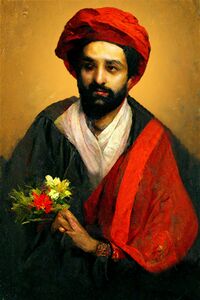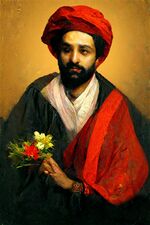Al-Sayyid al-Mu'alim
Al-Sayyid al-Mu'alim | |
|---|---|
 | |
| Born | Sayyid Zayna'l-Hasan bi-dhikri'llah c. 1016 CE (c. 406-407 AH) Jasil Salabalar, modern-day Maqtajer |
| Died | c. 1093 CE (52 AA) |
| Other names | Qa'im al-Qiyamah, Al-Wakil (see Epithets, names and titles of Al-Sayyid al-Mu'alim) |
| Known for | Founding Esoteric Shi'ism |
| Part of a series on | |||||
| Esoteric Shi'ism | |||||
|---|---|---|---|---|---|
 | |||||
| The Seven Figures | |||||
|
|||||
| The Seven Principles | |||||
|
|||||
| Beliefs and practices | |||||
| Place of worship | |||||
|
|||||
| Holy days | |||||
|
|||||
| Texts | |||||
| Governance | |||||
Al-Sayyid al-Mu'alim, born Sayyid Zayna'l-Ahsan bi-dhikri'llah al-Shaykhedi (1016-1093 CE;), was the founder and central figure of Esoteric Shi'ism. Born in Jasil Salabalar, modern-day Maqtajer, he announced his claim as the Qa'im al-Qiyamah and the recipient of a new revelation from God in 1041. According to Esoteric Shia doctrines, the Lisan al-Hikma, the holiest of the books of Esoteric Shi'ism, was revealed to Al-Sayyid al-Mu'alim by God through the Hidden Imam. His teachings form the basis for Esoteric Shia religious belief and ethos, ranging from the unequivocal equality of men and women, the importance of reason, the acceptance of religious differences, the rejection of blind imitation as well as social justice. He was a controversial figure; condemned as a false prophet by the Zahiri Shias of what is now Jartasti, but revered by Esoteric Shias as the symbolic return of the Hidden Imam and the promulgator of a new religion. The abrogation of the old religion and the establishment of a new religion, a new book, and new laws by Al-Sayyid al-Mu'alim, Esoteric Shias believe, fulfilled Zahiri Shia eschatological predictions that the Hidden Imam would come to introduce a new book, new laws, and a new religion 'on the Day of Resurrection'.
Al-Sayyid al-Mu'alim was born to the Shaykhedis, a prominent clan of Zahiri Shias in Jasil Salabalar. According to the hagiographic Esoteric Shia chronicle Tarikh al-Qa'im, he was born on the ninth night of the Islamic month of Muharram in 406–407 AH, corresponding to 1016 CE. His father, Sayyid Mustafa, was a successful merchant, trading in textile and rare goods between Muzdatijer and Srambi (modern-day Hindia Belanda), who died in an ambush whilst Al-Sayyid al-Mu'alim was five years old. His mother was the daughter of a Yazidi chief in the town of his birth. He was the third eldest of his four brothers, all of whom played a pivotal role in disseminating Al-Sayyid al-Mu'alim's teachings to the Shias of Muzdatijer. His ministry began in 1041 CE, at twenty-five, when he was found missing only to reappear in his house three days later. He reported seeing a vision of the Hidden Imam who recited to him the first few verses of the Lisan al-Hikma. Al-Sayyid al-Mu'alim openly declared his station in 1041 to the people of Jasil Salabalar, exhorting them to take heed of the new revelation.
The beginning of his ministry marked the start of a new epoch and a new calendar, reckoned from the day he publicly proclaimed his station. He ministered for 10 years in Muzdatijer, being itinerant for most of the time, until the migration of Esoteric Shias to Tanjudan, in modern-day Hindia Belanda, due to growing persecution from the Shias of Muzdatijer. His teachings were recorded by a number of personal scribes, whose writings Al-Sayyid al-Mu'alim personally oversaw and would then be sent to the many pockets of Esoteric Shias throughout Jartasti and Tanjudan. These writings, in addition to the Lisan al-Hikma, are collectively considered Esoteric Shia scripture. Al-Sayyid al-Mu'alim spent a major part of his life ministering in Tanjudan, with the support of the Duke of Srambi, who had converted to his religion. There, his followers grew exponentially; by the time of his death in 1093, it is estimated that there were close to 15,000 Esoteric Shias.
Names, titles and epithets
Al-Sayyid al-Mu'alim was born Sayyid Zayna'l-Hasan bi-dhikri'llah. He began using the title Al-Sayyid al-Mu'alim after he reported seeing a vision of the Hidden Imam commanding him to call himself by the title, which means 'Master and Teacher', for the rest of his life. The title Sayyid is a honorific title given to people who claim descent from the Imams of Shi'ism.
He is also called by the epithet Qa'im al-Qiyamah, or Lord of Resurrection, for his role which Esoteric Shias believe he played in ushering the symbolic Day of Resurrection.
Early life
Life as founder of Esoteric Shi'ism
Proclamation of his ministry
Muzdatijer period
Tanjudan period
Teachings and writings
The Lisan al-Hikma
Orations
The Last Advice
Other texts
Death
Establishment of the Auxiliary Imamate
In popular culture
Theatre
The life of Al-Sayyid al-Mu'alim has been dramatised in Hindia Belandan theatre. The Lord of Resurrection, a 19th-century play by the playwright Ahsan Dominieksz, portrays the life and ministry of Al-Sayyid al-Mu'alim.